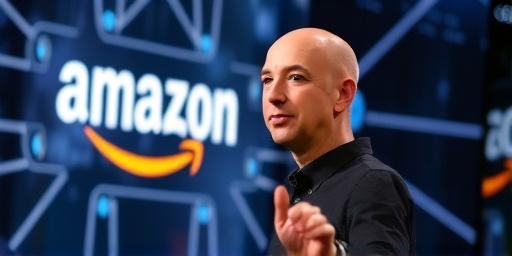In a groundbreaking announcement that has sent ripples through the tech industry, Amazon founder Jeff Bezos has revealed Project Prometheus, a staggering $6.2 billion initiative aimed at revolutionizing how artificial intelligence (AI) interacts with the physical world. Unveiled during a virtual keynote from his Blue Origin headquarters, the project signals Amazon’s aggressive pivot toward embedding AI into everyday objects and infrastructure, potentially transforming sectors from transportation to smart cities. This move comes at a time when AI adoption is accelerating globally, with market projections estimating the physical AI sector to reach $500 billion by 2030.
- Project Prometheus Unveiled: A Blueprint for AI in Hardware Integration
- Amazon’s Shift Toward Physical AI: From E-Commerce to Real-World Dominance
- Sparking Debates: Retrofits for Legacy Tech and Ethical AI Concerns
- Global Partnerships and Startup Ecosystem Boost from Bezos’ Vision
- Looking Ahead: Prometheus’ Role in Shaping Tomorrow’s AI Landscape
Bezos, who stepped down as Amazon’s CEO in 2021 but remains its executive chairman, emphasized the project’s potential to ‘bridge the digital and physical realms,’ drawing parallels to Amazon’s early dominance in e-commerce. ‘We’re not just building software; we’re reimagining hardware through AI’s lens,’ Bezos stated, highlighting investments in AI-driven robotics, sensor technologies, and adaptive systems. The initiative, backed by Amazon’s vast resources, positions the e-commerce giant as a formidable player beyond online retail, challenging competitors like Google and Tesla in real-world AI applications.
Project Prometheus Unveiled: A Blueprint for AI in Hardware Integration
The core of Project Prometheus lies in its focus on integrating AI into physical applications, moving beyond cloud-based services to tangible innovations. Bezos detailed how the $6.2 billion funding—sourced from Amazon’s innovation arm, AWS, and Bezos’ personal investments—will fuel partnerships with startups specializing in edge computing and machine learning hardware. One key pillar involves developing AI systems that can retrofit existing infrastructure, such as urban traffic networks and industrial machinery, with minimal disruption.
According to project documents leaked to tech outlets, Prometheus will allocate $2.5 billion to R&D for ‘adaptive AI modules’—compact devices that learn from their environments to optimize performance. For instance, these modules could enhance energy efficiency in smart grids by 30%, based on preliminary simulations shared during the announcement. Bezos cited Amazon’s existing robotics expertise from its warehouse operations as a foundation, noting that the company’s Kiva robots already process over 1 million items daily with AI guidance.
Industry analysts praise the strategic timing. ‘Amazon is leveraging its data moat to enter physical AI, where scalability is king,’ said Sarah Chen, a Forrester Research principal analyst. She pointed to Amazon’s 2023 AI revenue surge of 45% year-over-year as evidence of readiness. However, the project’s scale raises questions about execution, with some experts warning of regulatory hurdles in deploying AI in public spaces.
Amazon’s Shift Toward Physical AI: From E-Commerce to Real-World Dominance
For Amazon, Project Prometheus represents a bold departure from its digital-first roots, eyeing expansion into hardware and services that touch the physical world. Bezos highlighted ambitions to create an ‘AI ecosystem’ where devices communicate seamlessly, similar to how Alexa integrates voice AI into homes. The initiative includes a $1.8 billion commitment to acquiring or incubating startups focused on AI for mobility and logistics, potentially accelerating Amazon’s drone delivery dreams.
A significant aspect involves automotive applications, where Prometheus aims to retrofit older vehicles with AI enhancements. Bezos referenced the growing electric vehicle market, valued at $623 billion in 2023, and Amazon’s investments in Rivian, its EV partner. ‘Imagine your 2010 sedan gaining autonomous features overnight,’ Bezos quipped, alluding to plug-and-play AI kits that could upgrade braking systems or navigation without full replacements. This retrofit focus addresses the ‘old car tech’ dilemma, as over 1.4 billion vehicles worldwide are pre-2020 models lacking modern AI capabilities.
Amazon’s internal stats underscore the rationale: Its logistics fleet, comprising 100,000+ vans, could see fuel savings of up to 20% through AI-optimized routing. External partners, including a consortium of European startups, will test prototypes in pilot programs starting next year. Yet, this expansion isn’t without risks; Amazon faces antitrust scrutiny, with the FTC probing its acquisitions for monopolistic tendencies.
Sparking Debates: Retrofits for Legacy Tech and Ethical AI Concerns
The announcement of Project Prometheus has ignited fierce debates, particularly around retrofitting legacy technologies like older cars with AI. Proponents argue it democratizes advanced tech, making AI accessible to the masses without costly overhauls. A study by McKinsey estimates that AI retrofits could add $1.2 trillion to global GDP by 2040 through efficiency gains in transportation alone.
Critics, however, decry potential safety risks. ‘Retrofitting grandma’s station wagon with experimental AI? That’s a recipe for chaos,’ warned Dr. Elena Vasquez, an AI ethics professor at MIT. She highlighted data privacy issues, as Prometheus devices would collect real-time environmental data, feeding into Amazon’s vast cloud. Regulatory bodies like the NHTSA have already signaled interest, with preliminary guidelines expected by 2025.
Environmental advocates see promise: By extending the life of existing hardware, the project could reduce e-waste by 15%, per EPA projections. Bezos addressed concerns head-on, pledging $500 million for ethical AI research within Prometheus, including bias audits and transparent algorithms. Quotes from startup founders involved, like Aria Tech’s CEO Raj Patel, reflect optimism: ‘Partnering with Amazon on this is like strapping a rocket to our innovations.’
The debate extends to labor impacts. Amazon’s warehouse automation has displaced thousands of jobs; similar fears loom for mechanics and drivers as AI retrofits proliferate. Union leaders from the Teamsters have called for workforce retraining programs, which Bezos promised to support through Amazon’s Upskilling 2025 initiative, already training 300,000 employees in AI skills.
Global Partnerships and Startup Ecosystem Boost from Bezos’ Vision
Jeff Bezos‘ involvement has supercharged Project Prometheus, drawing global startups into Amazon’s orbit. The project includes a $1.2 billion venture fund targeting early-stage companies in AI hardware, with applications opening next month. Already, partnerships with Singapore’s AI hub and Israel’s defense-tech firms signal international scope, aiming to deploy pilots in Asia and Europe by 2026.
Bezos’ track record with ventures like Blue Origin and The Washington Post lends credibility. ‘This isn’t philanthropy; it’s a calculated bet on the physical economy,’ noted Bloomberg analyst Mike Johnson. Amazon’s AWS, powering 40% of the cloud market, will provide the backbone, integrating Prometheus AI with services like SageMaker for machine learning.
Statistics paint a vivid picture: The global AI hardware market is projected to grow from $15 billion in 2023 to $120 billion by 2030, per IDC. Amazon’s entry could capture 25% share, analysts predict, bolstering its $1.8 trillion market cap. For startups, the opportunity is immense—Bezos announced grants for 50 emerging firms, focusing on sustainable AI for physical applications like climate-resilient agriculture.
Challenges persist, including supply chain vulnerabilities exposed by recent chip shortages. Amazon plans to mitigate this by investing in domestic semiconductor production, aligning with U.S. CHIPS Act incentives worth $52 billion.
Looking Ahead: Prometheus’ Role in Shaping Tomorrow’s AI Landscape
As Project Prometheus ramps up, its implications for Amazon and the broader AI ecosystem are profound. By 2027, the initiative could deploy AI retrofits in 10 million vehicles worldwide, per internal forecasts, slashing urban congestion by 12% in test cities. Bezos envisions a future where physical objects ‘think’ independently, fostering innovations in healthcare wearables and disaster-response drones.
Competitors are responding: Tesla’s Elon Musk tweeted skepticism, calling it ‘Amazon’s vanity project,’ while Microsoft eyes similar physical AI expansions via Azure. For consumers, affordability is key—Prometheus kits are slated to cost under $500, making AI upgrades viable for middle-income households.
The project’s success hinges on collaboration. With Jeff Bezos at the helm, Amazon is poised to redefine physical-digital convergence, but ethical deployment will be crucial. As one startup executive put it, ‘Prometheus isn’t just funding; it’s igniting a new era.’ Stakeholders worldwide will watch closely as this $6.2 billion gamble unfolds, potentially reshaping how we live, work, and move in an AI-infused world.








